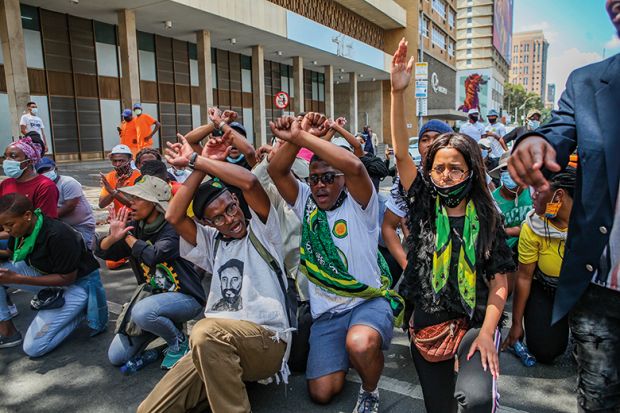More than 100,000 South African students who have completed their studies are yet to receive their degree certificates because of unpaid fees, highlighting the mounting difficulties facing the country’s “missing middle”.
Data released in response to a parliamentary question show that 106,494 students who left 21 institutions between 2010 and 2020 were yet to receive official transcripts and qualification documents because of outstanding fees totalling R10.4 billion (£503 million), potentially leaving them unable to make use of their degrees in the job market.
Some universities said that they provided students who had not officially graduated with documents reflecting their results, which they can give to employers.
But experts said that the data were another sign of the challenges facing South Africa’s “missing middle” – students whose families are not poor enough to qualify for free tuition, introduced in 2018, but not rich enough to be able to easily pay the costs of higher education. Many take out loans to fund their degrees.
Tensions over the issue have been high over the past month since protesters at the University of the Witwatersrand demanded that current students with outstanding fees be allowed to register for the new academic year. One bystander was shot dead, allegedly by police officers who are now facing murder charges, and a student was shot in the leg.
While Wits has promised to raise funding for students with outstanding fees, the protests subsequently spread to other campuses.
Martin Hall, a former deputy vice-chancellor of the University of Cape Town who is now an emeritus professor at the institution, said that middle-income students faced a “perfect storm”, with the pandemic putting additional strain on family finances and South Africa’s National Student Financial Aid Scheme struggling to provide eligible students with loan or bursary payments on time.
Students with parents in professions such as teaching and nursing may be classed as too wealthy to receive free tuition, but fee costs could still dwarf household incomes, Professor Hall explained.
He added that it would require a national solution from the government because the problem was “too big for individual universities to deal with”. However, higher education minister Blade Nzimande, who recently came under fire for likening years of student protests to a soap opera, has said that the government cannot afford to write off historical student debts.
Some institutions are providing additional support for current and former students with outstanding fees.
Professor Hall said that universities were “putting in place plans to allow students to come back. They are doing what they can, with resources severely impacted by the pandemic and lockdowns.”
后记
Print headline: Degrees withheld over unpaid fees




